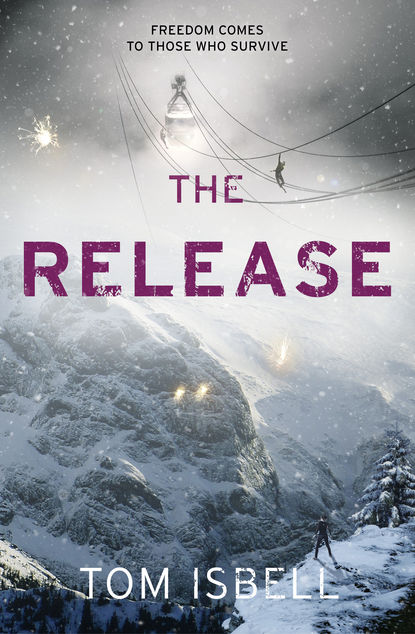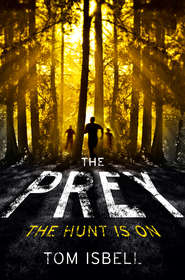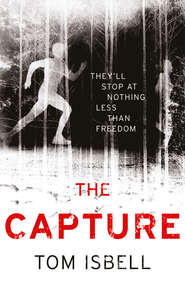По всем вопросам обращайтесь на: info@litportal.ru
(©) 2003-2025.
✖
The Release
Настройки чтения
Размер шрифта
Высота строк
Поля
IT WAS STRANGE TO be following the same path we’d used to escape from the Compound. Once more, we were racing to something we’d already escaped from. I longed for the day when we could just live in one place.
Red raised his hand and motioned Flush and me to stop. He pointed to Argos, who was sniffing the ground with a sudden intensity. When he lifted his head, snow encrusted his muzzle.
Directly next to his front paws were human footprints.
I lowered myself to the ground and analyzed the treads; they weren’t from the moccasins of the Skull People nor the rags of the Crazies. These were pre-Omega shoes: Brown Shirt boots.
Soldiers.
My body gave an involuntary shudder.
“How many, do you think?” Flush asked.
“Looks like two.”
“Recent?”
“Recent enough.”
The footprints veered inland, away from the river but in the direction of the Compound.
“Do we follow them?” Flush asked.
“Do we have a choice?”
We shared a look, and Argos took off at a trot.
The footsteps were easy enough to track, and by midafternoon Flush pointed to the far horizon. Squinting across the flat tundra of snow, all I could make out was a speck of a distant object, sparkling sunlight.
“Solar panels,” Flush explained. “I used to clean those things.”
That was his job at the Compound. While I was working in the Wheel, he was helping harness energy.
“So we’re close?” Red asked.
“Not just close,” Flush said. “We’re probably above the Compound right now.” We all looked at our feet, envisioning what was on the underside of the ground.
We marched on, eager to reach the Compound entrance … and dreading it just the same.
It was the smell that suddenly led us forward. The footsteps were still there, of course, but we could have reached the Compound from the scent alone.
No, not scent—more like stench.
“What the heck?” Flush said.
Neither Red nor I answered, because we each had a suspicion we didn’t want to voice. The Brown Shirts’ rotting, putrefying bodies outside Libertyville had taught us what death smelled like. But why was that smell so strong out here, especially the closer we got to the Compound?
When the footsteps forked in the direction of the Compound’s main entrance, we abandoned them and went the other way, following the smell instead. We needed to see where it led us.
We were now in a field of corn stubble, dead stalks jutting from the snow. With each passing step, the bile rose in my throat, and my imagination was working overtime. Did we really want to discover the source of this awful stench?
Argos stopped and began to whimper. At first, I thought he was picking up the scent of more footsteps. Then I saw the black oval—a small hole in the middle of the field. It was nearly invisible to the naked eye … and just wide enough in diameter to allow a human body.
“Good boy,” I said, and nudged him out of the way.
I got down on hands and knees and inched forward, then stuck my head into the opening. There was a long wooden ladder that descended into darkness. Where it led was impossible to see. All I knew was that a wave of rancid smells gushed through the narrow opening, like lava spewing from a volcano.
I recoiled, breathing through my mouth to avoid gagging. It was rotten eggs and dead skunk and overflowing outhouses all mixed together. My eyes watered after a single whiff.
“Where’s it lead?” Flush asked.
“Hell,” I answered … and then started making my way down.
10. (#ulink_a889e61c-764d-5df3-b31d-5fe0749d0f47)
THE THREE BROWN SHIRTS reappear, once more lugging wooden crates that they slide into the Humvee. When they return to the silo, Hope, Cat, and Sunshine rise to their feet and scamper across the snow.
They enter through the open gate and ease around the mound, stopping when they reach a thick metal door. Cat nods and the three of them step inside. When Hope’s eyes adjust to the gloom, she sees that they’re in a small antechamber. An elevator door stands straight ahead; to the side is a tube with a metal ladder descending straight down. She bends her head and listens. Voices spiral up.
With a series of hand gestures, Hope motions that she’ll go first, climbing down the ladder into the heart of the silo. She has no idea who’s down there … or what she’s getting into.
When she reaches the bottom, the first thing she sees is an open reinforced steel door. It’s easily two feet thick. Beyond it is a series of tunnels branching off in varying directions. Soldiers’ voices echo from a nearby chamber.
When Cat and Sunshine join her, they head toward the voices. On the way, Hope spies a side room, stacked with dozens and dozens of crates. More weapons.
Hope looks at Cat. Are you seeing all this?
He gives a nod.
As they tiptoe through one of the tunnels, still trying to follow the soldiers’ voices, Hope knows they’re buried beneath countless tons of earth and steel and reinforced concrete. Even if this place took a direct hit during Omega, it would have come out just fine.
They reach a cramped soldiers’ quarters: a couple of bunk beds, a primitive lavatory, a small kitchenette. In former times, soldiers lived here. Now, it’s just storage space, filled floor to ceiling with more crates.
The Brown Shirts’ voices grow suddenly louder, and Hope, Cat, and Sunshine duck into the nearest doorways. When the soldiers approach, Hope lets them walk by … and then she tiptoes forward, following. Just as her hand reaches for her knife, her shoes make a squeaking sound from the melting snow. The trailing Brown Shirt turns around.
His eyes open wide when he sees her. “Hey, you can’t—”
Hope sends her foot into the soldier’s groin. “I just did.”
His face turns strawberry as he collapses to the ground. Cat and Sunshine leap forward. The other Brown Shirts throw their crates and make a run for it, drawing weapons as they do.
“Damn it!” Cat curses, dodging the tossed crates and taking off after the soldiers. Sunshine follows.
At the first intersection of tunnels, one Brown goes right and the other goes left. With a quick nod of his head, Cat motions for Sunshine to follow the one to his right while he goes the other way.
No sooner does Cat step into the tunnel than it goes black; the soldier switched off the lights. Cat freezes, willing his eyes to adjust to the black. He tilts his head to the side, straining to hear. All he can make out is the steady, muffled, faraway sound of the soldier’s breathing. And then the click of a pistol being readied.
Cat freezes. One series of blind gunshots down this narrow tunnel and Cat’s a dead man. He presses himself against the wall.
Другие электронные книги автора Tom Isbell
The Prey




 0
0







